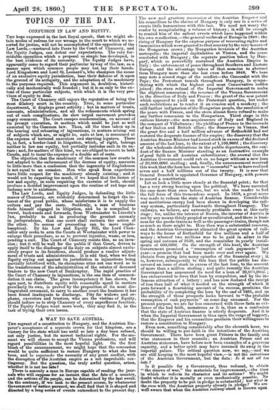TOPICS OF THE DAY.
CONFUSION IN LAW AND EQUITY.
THE hope expressed in the last Royal speech, that we might ob- tain modes of redress for our wrongs in the court to which we re- sorted for justice, will not be accomplished if the opposition of the Law Lords,—nurtured into Peers by the Court of Chancery, and the Equity Judges, can defeat our expectations. The very for- midable opposition which a proposal so aimple'has developed, is the best evidence of its necessity. The Equity Judges have apparently come to regard their particular byway of the law, as manor upon which common people may not lay their hands. Lord Kingsdown and Lord St. Leonard's, who ehampion the eause of an exclusive equity jurisdiction, base their defence of it upon the ground of its antiquity, and the adaptation of its machinery to the purposes required. This argument is, doubtless, histori- cally and mechanically well founded ; but it is as only to the ex- tent of those particular subjects, with which it is the very pro- vince of equity to deal. The Court of Chancery still enjoys the reputation of being the most dilatory court in the country. True, in some particular department, it displays great activity ; but in matters of trusts, accounts, administration, and all the refinements which spring out of such complications, its slow torpid movement provokes angry comment. The Court escapes condemnation, on account of its prompt execution, in matters which could be just as well executed by the Common law. Thus, all the time taken up in the hearing and rehearing of injunctions, in matters arising out of subjects which are, or might be, suits at law, is consumed at the expense of tortured executors and starving legatees. There ie, in fact, a border-land in litigation, which, of right, belongs neither to law nor equity, but partially includes each in its na- ture ; and, for matters of this kind, we are obliged to resort to both Courts, and to inour the expense of a double set of coats.
The objection that the machinery of the common law courts is not adapted to the enforcement of the decrees of equity, amounts to little more than a confession that the ingenuity of Englishmen is not equal to au occasion. Men who speak from experience have little respect for the machinery already existing ; and it would not be expecting too much, if we hoped that the fusion of law and equity, in suits requiring the exercise of both, should produce a decided improvement upon the routine of red. tape and foolscap now in existence.
The Law Lords, and Equity Judges, in defending the little manor of Chancery, are evidently determined to forget the in- terest of the great public, whose misfortune it is to supply the suitors and pay the costs. Suddenly, a man of business finds himself engaged in • litigation, and he is compelled to travel, backwards and forwards, from Westminster to Lincoln's Inn, probably to end in producing the greatest anomaly in jurisprudence, that one court shall restrain the action of the other. No course of proceeding can be more unphi- losophical. By his Law and Equity Bill, the Lord Chan- cellor only seeks to arm the Courts at Westminster with power to enlarge their procedure, so as to prevent injustice, waste, or loss, pending a suit. The Court of Chancery resists this, s an inva- sion; but it will be well for the public if that Court, driven to apply itself to the discharge of its duty on subjects almost exolu- sively proper to its functions, should produce a readier adjust- ment of trusts and administration. - It is odd that, when we find Equity crying out against its jurisdiction in injunctions being partially interfered with, its champions utter not one word as to the transferrence of the administration of the estates of deceased traders to the new Court of Bankruptcy. The rapid practice of the Court of Chancery in injunctions, is the one item of commen- dation it can claim. The gross incompetency, it has shown, for ages past, to distribute equity with reasonable speed in matters peculiarly its own, is proved by the proposition of its most dis- tinguished ornament, to carry to another court the business it has been found inadequate to discharge. Pity for widows and or- phans, executors and trustees, who are the viethns of Equity, should induce us to strip Chancery of every superfluous function. If the Equity Judges want more work, they may find it, in the task of trying their own issues.


























 Previous page
Previous page